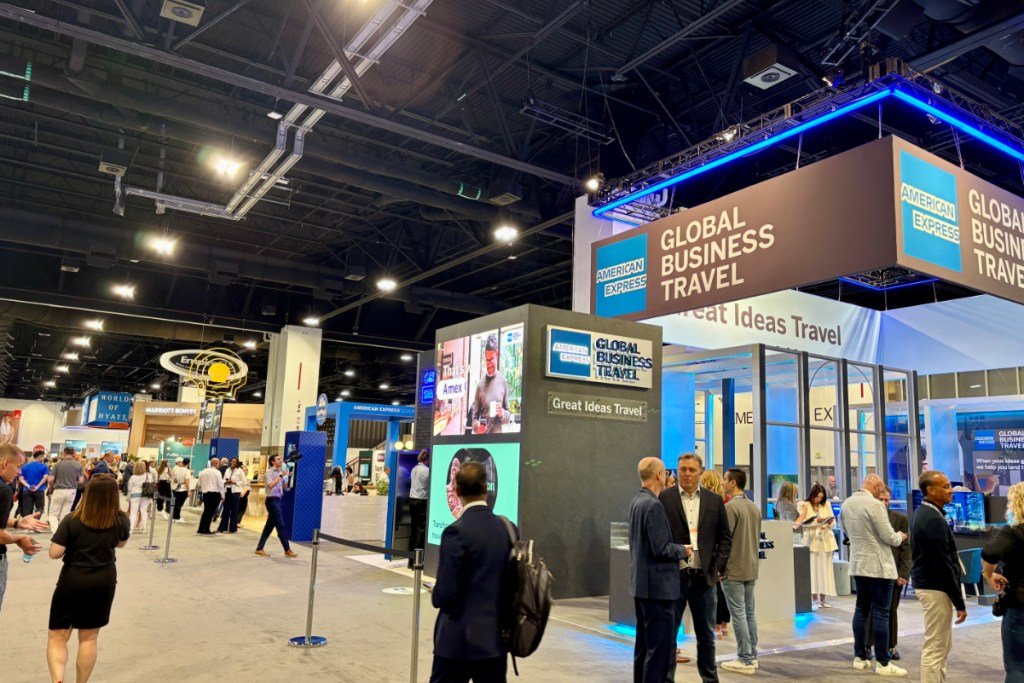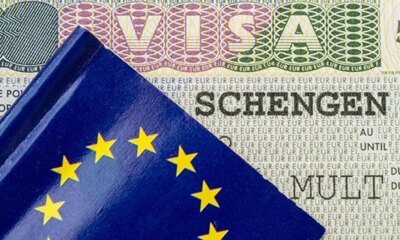AI in Travel
Q&A with Robert Townshend, Total Advantage Travel: Winning Big, Driving Change & Thriving in Travel

This year’s Travelsavers Chairman’s Award—the highest honour presented to affiliate agencies—was awarded to Total Advantage Travel & Tours, led by longtime industry veteran Robert Townshend.
With nearly four decades in the travel business, the president of Total Advantage Travel has seen it all—and adapted through it all. TravelPulse Canada caught up with him in his Toronto office.
In a candid conversation, Townshend opens up about the strategy behind the win, his passion for advocacy, and why he believes travel advisors must embrace change while standing firm on their worth.
RELATED: Travelsavers Canada Honours Top Agencies and Partners at 2025 Travel Market
Total Advantage Travel & Tours received the Chairman’s Award – Agency, Travelsavers Canada’s highest honour, for being the top-producing agency of the year. (Photo Credit: Travelsavers Canada)
Q: First of all, congratulations on winning the Chairman’s Award. What does this recognition mean to you?
Robert Townshend: It means a lot—not just to me personally but to all the hardworking people under our umbrella at Total Advantage. We’re about 60 strong, and this was a complete team effort. Everyone has an entrepreneurial mindset, and when you bring that together in a supportive environment, it leads to recognition like this.
Q: Was there a specific turning point or strategy that helped Total Advantage stand out?
RT: Yes. In late 2023, I met with the entire team and said: “We need to focus on supporting our preferred suppliers.” I asked every advisor to prioritize Travelsavers preferred partners—using their marketing materials, visiting the portal daily for updates, and really making it a central part of how we operate. Our overall sales were strong, but our preferred numbers weren’t where I wanted them to be. That unified push made all the difference.
Q: You’ve been in the travel industry for nearly 40 years. What’s the biggest shift you’ve seen?
RT: When I started, everything was commissionable—airlines were paying 10% on U.S. tickets, 8.25% on domestic, and even more internationally. But when United stopped paying commission in 2001, it was a wake-up call. We had to reframe ourselves as professionals and start charging service fees. That was a major turning point.
Q: You’ve been vocal about travel advisors never working for free. Why is that so important to you?
RT: Because we’re professionals, no one works for free—and neither should travel advisors. It’s the only industry I know where someone could spend hours building an itinerary, only to have the client book it online. I always tell my team: get a fee or get out. You can always credit it back if the client books with you, but your time is valuable.
Q: You’re also deeply involved in advocacy work. Why do you serve on the TICO board?
RT: I’m the vice chair of the TICO Board, and I also sit on the Business and Regulatory Committee and the Governance Committee. The industry voice at TICO is small—only three out of nine board members are from within the industry. I’m there to ensure travel advisors and registrants have a voice. We’re working hard behind the scenes on changes that will elevate this profession and make it more respected.
Q: What’s the busiest area of travel for your agency right now?
RT: The area that’s taken off more recently than ever before is solo travel. The number of people we’ve booked on their own has more than doubled over the past year. Instead of waiting for a friend to say, “Yes, I can go,” people—especially women—are saying, “I’m not going to wait. I’m going to go and see it myself.”
They’re actively looking for tours that have reduced or no single supplements, and cruise lines like Norwegian are embracing this trend with solo cabins—designed just for one person. Those cabins sell out almost every voyage. It’s clear: people want to travel, and they’re no longer waiting for someone to join them.
RELATED: TICO Appoints New Members to Consumer and Industry Advisory Councils
Q: Do you think the pandemic helped fuel that shift?
RT: Absolutely. After being locked up for so long, people realized they weren’t going to wait anymore. I’m leading a tour to Italy and was shocked to find that more than half the travellers are solo. It’s a reflection of a mindset change—people want to go now, with or without company.
Q: Can you share a personal trip that truly changed your life—and how it shaped the way you work with clients?
RT: Without a doubt, the most life-changing trip I’ve ever taken was an African safari in 2018 to Kruger National Park in South Africa. I stayed at a lodge inside the park for five days, and every day we went out on morning and afternoon drives. We got up close with all kinds of animals in their natural habitat. But the real impact wasn’t just the scenery—it was the silence.
I didn’t check emails. I didn’t return voicemails. I disconnected from everything. For those five days, I was completely cut off from the rest of the world—and it was transformational. When I came back, I was so relaxed, so stress-free, I can’t even begin to describe it. I didn’t care about the little things anymore. Gone were the days of honking the horn if someone didn’t turn left on a green light. I didn’t get irritated in line at the store. I was just… chill.
And that feeling? It stayed with me for a year. A whole year. It changed my entire personality, my perspective. I tell people now: if you want to de-stress your life, don’t turn to pills. Go on a life-changing trip.
Whether it’s an African safari, an Antarctic cruise, or a river journey through Cambodia, there are certain experiences that stick with you—that reset you.
RELATED: WestJet and Kenya Airways Sign Interline Deal to Expand Canada–Africa
Q: You also taught travel and tourism at Centennial and Sheridan College. What drove you to education?
RT: I wanted to help shape the next generation of travel professionals and set realistic expectations. So many students come into the industry thinking it’s all about free trips. But the reality is you’re up at 3 a.m. helping someone who lost their passport. It’s high stress. But it’s also highly rewarding—if you’re prepared.
Q: What advice would you give to new advisors starting out?
RT: Build a loyal clientele. That’s your greatest asset.
My advice would be to develop yourself a good and faithful, loyal clientele that will stick with you throughout your career… Once you build them up, you can then nourish it and get referrals from friends of your current clients… You won’t have to advertise your services because your services will be recommended just by word of mouth from the clientele that you’ve built up.
Q: What are your thoughts on AI and its impact on travel?
RT: AI is here to stay. I believe we should embrace it, not fear it. It’s like when the internet first came out—everyone thought it would wipe out jobs. But it didn’t. We still need human expertise. At Total Advantage, we’re using Travelsavers’ AI Connect to assist with research and writing, but AI can’t replace human intuition or relationship-building.
Q: Where are people looking to travel right now?
RT: There’s been a huge increase in domestic travel this summer. I’ve never sent so many people to New Brunswick, Nova Scotia, and Newfoundland in my life. Everyone seems to want to stay within Canada—Alberta and B.C. are popular too—but the Maritime provinces really benefited from people choosing not to travel to the U.S.
RELATED: Whales, Trails, and Chowder Under the Stars: Come From Away to Unpack Newfoundland’s Magic
I had a family of eight who had already booked flights to the U.S. and paid for a rental condo. Two weeks later, they called me back and said, “You know what? We’ve changed our minds. We’re not going to support that regime.” They took the hit, cancelled everything, and rebooked their Air Canada flights to Cartagena, Colombia. They said they couldn’t, in good conscience, travel to the U.S., and felt like traitors after telling their friends and family about their plans.
So we’ve started doing “Destination Dupes”—like instead of skiing in Utah, go to Calgary. We’re trying to help clients find alternatives that align with their values.
Internationally, one of the biggest shifts I’ve seen is the number of Canadians booking trips to the south of Portugal, especially the Algarve. I’ve never had this many people asking for it. The weather’s not as warm as Florida—it’s about 15 degrees in the winter—but that’s better than sleet and ice. It’s more affordable, the cost of living is lower, it’s way more relaxed, and you’re not stuck in conversations with locals about who should be president.
In fact, I’m doing it myself. I usually go to Florida for the winter, but this year I’m going to Portugal instead. And many of my snowbird clients are staying three months, renting houses or condos—and yes, we can book that for them. Honestly, once Canadians start spending winters in Europe instead of the U.S., it’s going to be very hard to win them back.
Note: Responses in this article have been paraphrased and condensed for clarity and flow while preserving the essence of Robert Townshend’s original remarks.
Topics From This Article to Explore
AI in Travel
Tourism Malaysia And HONOR Malaysia Collaborate To Promote Visit Malaysia 2026 Through AI Technology

Saturday, August 2, 2025
Tourism Malaysia has teamed up with HONOR Technology (Malaysia) to change how the country promotes tourism. Through a Memorandum of Collaboration (MoC), both organizations will use new technology, specifically AI-driven digital storytelling, to improve Malaysia’s visibility in global tourism. This partnership aims to increase Malaysia’s presence in the international tourism market, especially ahead of the upcoming Visit Malaysia 2026 (VM2026) campaign.
A Game-Changing Collaboration
The partnership between Tourism Malaysia and HONOR Malaysia marks a significant shift in the tourism industry’s approach to promotional strategies. As the tourism sector increasingly embraces technological advancements, this collaboration is a prime example of how innovation can be leveraged to meet modern demands. Both organizations are committed to utilizing AI-powered technology to create engaging, interactive, and visually stunning content that will appeal to a broad audience, particularly the younger, digitally savvy generation.
Through the use of HONOR’s advanced AI-powered mobile technology, the partnership will deliver a series of creative initiatives designed to engage local and international audiences. The aim is to connect with travelers in a more dynamic, personal way, leveraging AI to produce content that is not only visually striking but also reflective of the diverse cultural and scenic beauty of Malaysia.
Key Initiatives Under the Partnership
The collaboration will kick off with a series of interactive campaigns designed to bring Malaysia’s most iconic tourist attractions to the forefront. One of the standout features of the partnership is a nationwide photography competition that will invite both local and international participants to capture Malaysia’s stunning landscapes and cultural landmarks. HONOR’s AI-enhanced smartphones will be the primary tool for participants, enabling them to capture high-quality images that showcase the country’s rich diversity.
In addition to the photography competition, the initiative will include guided photo tours at major tourist spots across Malaysia, giving travelers the opportunity to explore the country’s beauty through the lens of a professional photographer. These tours will provide participants with valuable insights into the history, culture, and natural wonders of Malaysia, helping to foster a deeper connection to the country.
Another highlight of the collaboration will be creative workshops, where industry experts will guide participants through the process of creating compelling travel content. These workshops will provide attendees with the skills they need to produce high-quality digital content, from photography to video production, all while highlighting Malaysia’s attractions. The workshops will also serve as a platform for cultural exchange, allowing local and international participants to share their experiences and ideas.
Furthermore, the collaboration will feature art exhibitions showcasing AI-enhanced visuals captured using HONOR smartphones. These exhibitions will offer a new perspective on Malaysia’s tourism offerings, blending technology with art to create visually captivating displays. The exhibitions will serve as both a celebration of Malaysia’s cultural heritage and a forward-thinking approach to tourism marketing.
The Role of AI and Mobile Technology
HONOR Malaysia’s role in this collaboration is crucial, as the company’s mobile technology and AI capabilities will be integral to curating visually compelling content. By utilizing AI-powered features such as scene recognition and photo enhancement, the smartphones will enable users to create professional-quality images with ease. This approach not only highlights the beauty of Malaysia but also encourages travelers to explore the country’s destinations in a more immersive way.
Tourism Malaysia’s involvement in the partnership focuses on facilitating access to the country’s top tourist attractions, providing logistical support, and amplifying the campaign’s reach through its extensive global tourism network. The government agency has long been at the forefront of efforts to promote Malaysia as a top tourist destination, and this collaboration with HONOR represents a new chapter in the country’s tourism marketing strategy.
Embracing Innovation to Appeal to Global Audiences
As Malaysia prepares for the Visit Malaysia 2026 campaign, the collaboration between Tourism Malaysia and HONOR Malaysia is a timely step towards modernizing the country’s approach to tourism promotion. By embracing AI and mobile creativity, the initiative aims to engage younger, tech-savvy travelers who are increasingly seeking interactive and personalized travel experiences. The partnership also aligns with global marketing trends, as more and more brands leverage digital platforms and emerging technologies to connect with consumers.
This collaboration is a significant move in ensuring that Malaysia’s tourism industry remains competitive in the global market. By focusing on user-generated content and encouraging creativity, the campaign aims to not only promote Malaysia’s scenic beauty and cultural richness but also foster emotional and visual connections with travelers worldwide. The campaign’s use of AI and technology ensures that Malaysia’s tourism offerings are showcased in a modern, dynamic light, capturing the attention of audiences across the globe.
Strengthening Public-Private Partnerships for Tourism Growth
The collaboration between Tourism Malaysia and HONOR Malaysia exemplifies the power of public-private partnerships in driving tourism growth. By combining the expertise and resources of both organizations, the partnership is poised to make a significant impact on Malaysia’s tourism sector. This MoC is also a testament to the growing recognition of the importance of innovation and technology in shaping the future of travel marketing.
As the Visit Malaysia 2026 campaign approaches, the collaboration is set to serve as a benchmark for how technology can be integrated into tourism promotion. The initiative will not only help boost Malaysia’s visibility in the global tourism market but also inspire other nations to embrace technology as a means of enhancing their tourism offerings. By blending tradition with innovation, Tourism Malaysia and HONOR Malaysia are setting a new standard for the future of travel marketing.
A Groundbreaking Step
In conclusion, the partnership between Tourism Malaysia and HONOR Malaysia is a significant move toward changing how tourism is promoted in the digital age. By using AI-driven digital storytelling and mobile technology, the collaboration seeks to improve Malaysia’s presence in global tourism and involve both local and international audiences in engaging and creative ways. As the Visit Malaysia 2026 campaign approaches, this partnership represents the changing connection between technology and tourism, paving the way for a more immersive and interactive travel experience for everyone.
AI in Travel
Revival of Ansett Australia with AI – What You Need to Know

Saturday, August 2, 2025
The Revival of Ansett Australia has taken a surprising turn, formerly one of the leading airlines in Australia has made an incredible comeback – albeit not as a full-service airline. The reintroduction of the airline was conceived by Melbourne entrepreneur, Constantine Frantzekos who saw an opportunity to reinvigorate the Ansett name and offer a more tailored and cost-effective means of flying, Through the platform, known as Ansett. Travel, powered by cutting-edge artificial intelligence, Frantzekos aims to transform how Australians plan and experience travel, bringing back the legacy of Ansett in a modern, digital form.
From Airline to AI Travel Platform
Launched many decades ago Ansett quickly became a household name and was most noted for its innovative flight experience coupled with world-leading customer service. But after it folded in 2001, the brand appeared to never fly again. But Frantzekos spied an opportunity in the moldering trademark, which had expired. Rather than siphoning the defunct airline’s DNA, he rebuilt the brand as an ultra-modern travel tech platform that prides itself on deep personalization and machine learning to serve 21st-century travelers’ changing needs.
AI-Driven Personalization for Modern Travelers
Ansett. Travel, Australia’s first travel agency wholly powered by A.I. The platform seeks to provide a more intelligent and personalized experience by mining users’ preferences using algorithms and machine learning. The AI makes personalized travel recommendations for trips, activities and experiences over time — it’s like your own personal travel concierge in the cloud. Users enter information about their travel experience — like the location, dates and interests at play—and an AI powered program conjures up bespoke itineraries, activities and amenities for them.
For instance, a user could plan for having their mate from Melbourne visit them to watch a major sports event such as the Ashes. The AI would then suggest things to do in the area and local accommodations/restaurants that suit their tastes. Private Charter Members also get the benefit of buying these services at very close to wholesale on Ansett VIP.
An Affordable Business Model Focused on Savings
The business model behind Ansett. Travel is based on two pillars, deep personalization and affordability. Users can enroll in a VIP membership for $99 per year, which entails discounts on flights, hotels and cultural experiences. The platform is planned to provide dramatic savings when compared against old fashioned travel agencies that are expensive in terms of overheads and staff. Instead, Ansett leverages technology to automate all of its operations and invests capital into building a platform while keeping a tiny support team.
Ansett is not a traditional travel agency, which can take the bulk of a dollar when it sells and then enjoys large profit margins. The website intentionally makes their pricing more competitive for travelers and leaves the difference in savings right up on company’s frontpage.
Combining AI with Human Support
Frantzekos draws parallels between Ansett. Travel and companies like Uber, which have bet on personalized service without traditional overhead. The service features a Chrome and Firefox extension (with Safari support coming) that lets consumers compare real-time prices on travel products while visiting other sites.
Despite being AI-driven, Ansett. Travel also reminds you how essential human contact is. With AI responsible for the majority of routine personalization duties, customer support agents can be on hand to help users when there are specific problems or they need assistance urgently. It is this melding of AI efficiency and human hospitality that makes for a smoother travel experience.
What Next, The Future of Ansett
While Ansett. Travel isn’t an airline, but Frantzekos says he wouldn’t rule out possibly branching the brand into air travel in some way down the line. For now he wants to give every Australian access to a next-level travel concierge that aspires on the nostalgia of Ansett with modern AI power. Ansett Australia is reborn in the Digital world, not flying but at the forefront of a new era, transforming travel using blockchain technology.
AI in Travel
Ex-Concur Founder Eyes “Perfect Trip” With New Startup Spotnana

Steve Singh spent two decades building Concur into the dominant travel-and-expense management platform before selling it to SAP for $8.3 billion in 2014. A year ago he became CEO of Spotnana, a startup that aims to solve the industry’s lingering problems.
The travel technology sector has struggled for years with fragmented systems that force companies to cobble together bookings from multiple sources while maintaining adequate customer service.
These back-end issues have delayed the arrival of what Singh called “The Perfect Trip” in an interview with Skift in 2014.
Now Singh argues that today’s cloud-native computing and machine learning can solve problems that proved intractable when he first tackled them at Concur more than 40 years ago.
“I haven’t been this excited about how tech can improve the corporate travel experience since mobile phones became widespread,” Singh said in an interview at Global Business Travel Association conference in Denver last month.
Automating Services
Spotnana’s approach centers on automating routine travel services like rebookings and refunds.
For corporate customers buying the travel, Spotnana will offer business intelligence tools and analytical services to let executives more clearly understand what their employees are spending on travel.
“Instead of a 15% cut across the board, which is indiscriminate, what if an AI agent could say, ‘I’ll get you the 15% savings by reducing travel spend by 40% for people that are not revenue producing while not reducing it at all for others, thanks to the intel I know on the clients they’re visiting and the productivity of those employees on the road,’” Singh said.
Singh claimed Spotnana could reduce travel management companies’ operational costs by roughly half. The tech vendor said it doesn’t accept global distribution system incentives and doesn’t hide or bias content to reach supplier volume targets.
Singh said Spotnana expects to deploy its AI agent capabilities within the next two to three years.
He described plans for “an AI agent that was trained on, say, your top 10% of your corporate travel agents” that could provide consistent, scalable service while understanding individual traveler preferences and company policies.
“Imagine an AI agent that not only knows me and my corporate policies and my personal preferences, but then it can also be an expert in every city I want to go for work or for leisure,” Singh said. “That starts to deliver a client experience that is no different than the world’s best executive assistant.”
Singh said that AI may also help with either predicting and responding in the moments when trips are disrupted by cancellations.
Automated reactions are key, he said: “If my flight is delayed, I shouldn’t have to pick up my phone and call somebody to change flights. Why can’t there be a recommendation pushed right into my app, saying here are the three options within your company’s travel policy, here are the three options outside your policy. Which one would you like?”
Frenemies
Spotnana, which has disclosed raising over $100 million in funding, faces established competitors with services that overlap.
While Spotnana is not a travel management company, its technology and full-content approach are similar to travel management companies like Navan (which has raised over $1.2 billion in funding) and TravelPerk (over $700 million).
Yet some industry observers remain skeptical about whether new technology can overcome the travel sector’s entrenched interests and complex commercial relationships. The American Airlines’ ill-fated effort to change how corporations and travel management companies book business travel suggests the challenges facing any attempt to change distribution.
But Singh said cloud computing costs are “one-tenth” of what they were 15 to 20 years ago. Key corporate travel systems are now cloud-native and use modern APIs, or data exchange methods.
More importantly, suppliers, buyers, and travel management companies have greater incentives to change the status quo, he said.
Spotnana offers its tech to Direct Travel, a company Singh also backs, and other travel management companies, such as Solutions Travel. It works with corporate buyers via connections with their preferred travel management companies.
Yet Spotnana is also a tool for the suppliers themselves.
“We think there’s multiple tiers of opportunity with our supplier partners,” Singh said. “One is the content distribution to travel management companies. But the other is that most of our supplier partners also want us to build other services for them.”
Spotnana’s effort to be all things to all people could get dicey if travel management companies come to fear it as potentially siphoning off their business by competing on fees and services to woo buyers.
Singh said he sees Spotnana’s opportunity with suppliers as being in providing services that travel management companies typically don’t, such as by giving suppliers deeper insights into their customers.
A case in point: Spotnana has partnered with Marriott to power the hotel chain’s small business portal, Business Access, handling both content distribution and booking management.
“We’re taking advantage of the biggest transformation I’ve seen in travel since we moved from paper based tickets to digital,” Singh said.
-

 Brand Stories2 weeks ago
Brand Stories2 weeks agoBloom Hotels: A Modern Vision of Hospitality Redefining Travel
-

 Brand Stories1 week ago
Brand Stories1 week agoCheQin.ai sets a new standard for hotel booking with its AI capabilities: empowering travellers to bargain, choose the best, and book with clarity.
-

 Destinations & Things To Do2 weeks ago
Destinations & Things To Do2 weeks agoUntouched Destinations: Stunning Hidden Gems You Must Visit
-

 Destinations & Things To Do1 week ago
Destinations & Things To Do1 week agoThis Hidden Beach in India Glows at Night-But Only in One Secret Season
-

 AI in Travel2 weeks ago
AI in Travel2 weeks agoAI Travel Revolution: Must-Have Guide to the Best Experience
-

 Brand Stories4 weeks ago
Brand Stories4 weeks agoVoice AI Startup ElevenLabs Plans to Add Hubs Around the World
-

 Brand Stories3 weeks ago
Brand Stories3 weeks agoHow Elon Musk’s rogue Grok chatbot became a cautionary AI tale
-

 Asia Travel Pulse4 weeks ago
Asia Travel Pulse4 weeks agoLooking For Adventure In Asia? Here Are 7 Epic Destinations You Need To Experience At Least Once – Zee News
-

 AI in Travel4 weeks ago
AI in Travel4 weeks ago‘Will AI take my job?’ A trip to a Beijing fortune-telling bar to see what lies ahead | China
-

 Brand Stories4 weeks ago
Brand Stories4 weeks agoChatGPT — the last of the great romantics













You must be logged in to post a comment Login